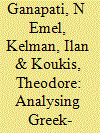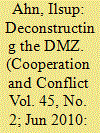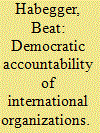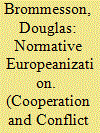| Srl | Item |
| 1 |
ID:
097793


|
|
|
|
|
| Publication |
2010.
|
| Summary/Abstract |
This article contributes to the disaster diplomacy literature in examining the conditions under which disasters can lead to long-term disaster-related collaboration (e.g. in disaster response, recovery or risk reduction) at both governmental and non-governmental level among states in conflict. In particular, the article focuses on the role of the 1999 earthquakes in enhancing such collaboration between Greece and Turkey over the past decade. While acknowledging the diversity and complexity of disaster diplomacy situations, the article suggests that disasters can lead to long-term disaster-related cooperation among states in conflict when: (1) one party providing disaster relief to another party is followed by a similar reciprocal gesture (i.e. tit-for-tat diplomacy); (2) there is a realization and acceptance that neighbours should come to each other's assistance in times of disaster; and (3) there is an enabling broader context (e.g. a rapprochement process) conducive to sustaining the long-term cooperation.
|
|
|
|
|
|
|
|
|
|
|
|
|
|
|
|
| 2 |
ID:
097795


|
|
|
|
|
| Publication |
2010.
|
| Summary/Abstract |
The Demilitarized Zone (DMZ) has been a global symbol of perpetual conflict, hatred and distrust since its establishment in 1953 after the Korean War. The 155-mile ceasefire line has given birth to moral pathologies in the minds of Korean people that include 'otherness is evil', 'containment of war is peace' and 'restoration of the same is unification'. The purpose of this article is to reduce these moral pathologies through Jacques Derrida's deconstructive approach and Emmanuel Levinas's ethics of the Other. Through tripartite reduction of these moral ideologies of the DMZ, an ethical thesis is developed that peace is not a mere state of the absence of war, but rather a welcoming of radical others and differences. It is also argued that unification is not about restoring the same 'original we', but about co-reconstruction of the 'democratic we'.
|
|
|
|
|
|
|
|
|
|
|
|
|
|
|
|
| 3 |
ID:
097794


|
|
|
|
|
| Publication |
2010.
|
| Summary/Abstract |
Many international organizations, including the United Nations, are accused of lacking democratic accountability. A variety of proposals have been made to close the gap between their extended influence and the lack of effective controlling mechanisms to prevent abuses of power. This article focuses on one specific proposal: the establishment of parliamentary assemblies. Based on the experiences of the Council of Europe and the Organization for Security and Cooperation in Europe, it presents the factors that enable such assemblies to exercise parliamentary control and influence towards intergovernmental decision-making bodies.The article shows how a parliamentary dimension can be introduced conceptually into the debate on the democratic accountability of international organizations and how these insights support the reflections on a United Nations parliamentary assembly.
|
|
|
|
|
|
|
|
|
|
|
|
|
|
|
|
| 4 |
ID:
097796


|
|
|
|
|
| Publication |
2010.
|
| Summary/Abstract |
In this article, the concept Normative Europeanization is developed from a synthesis of Normative Power Europe (NPE) and Europeanization. It is argued that NPE has focused too narrowly on the external relations of the European Union (EU), while Europeanization has focused on changes in policy structures. The synthesis developed here overcomes these shortcomings by emphasizing normative internal relations within the EU. Normative Europeanization is defined as a top-down process based on the logic of appropriateness, where states with a close relationship to the EU, i.e. candidate and member states, develop a commitment to a European centre and their normative point of departure is changed. It is argued here that a process of normative Europeanization affects candidate countries and new EU members especially where pro-European norms are diffused through different mechanisms. The theoretical argument is illustrated through a case study on Swedish foreign policy reorientation during the 1990s. The empirical analysis is structured around two ideal types: internationalist foreign policy and normatively Europeanized foreign policy. Based on this analysis, it is concluded that Swedish foreign policy has undergone strong normative Europeanization.
|
|
|
|
|
|
|
|
|
|
|
|
|
|
|
|
| 5 |
ID:
097792


|
|
|
|
|
| Publication |
2010.
|
| Summary/Abstract |
Theories of international law compliance have blossomed in recent years and many have been subjected to rigorous testing. In this exercise, we argue that theories based on managerial models are particularly promising in explaining why certain states comply more readily with international rules governing the safety of international shipping. Specifically, we test a wide range of variables drawn from interest-driven theories, as well as society-driven theories of compliance, and compare their explanatory power to governance-driven theories to explain anti-piracy policies and safety aboard ship. While many governance-driven variables correlate with both outcomes, they explain ship safety policies particularly well.
|
|
|
|
|
|
|
|
|
|
|
|
|
|
|
|